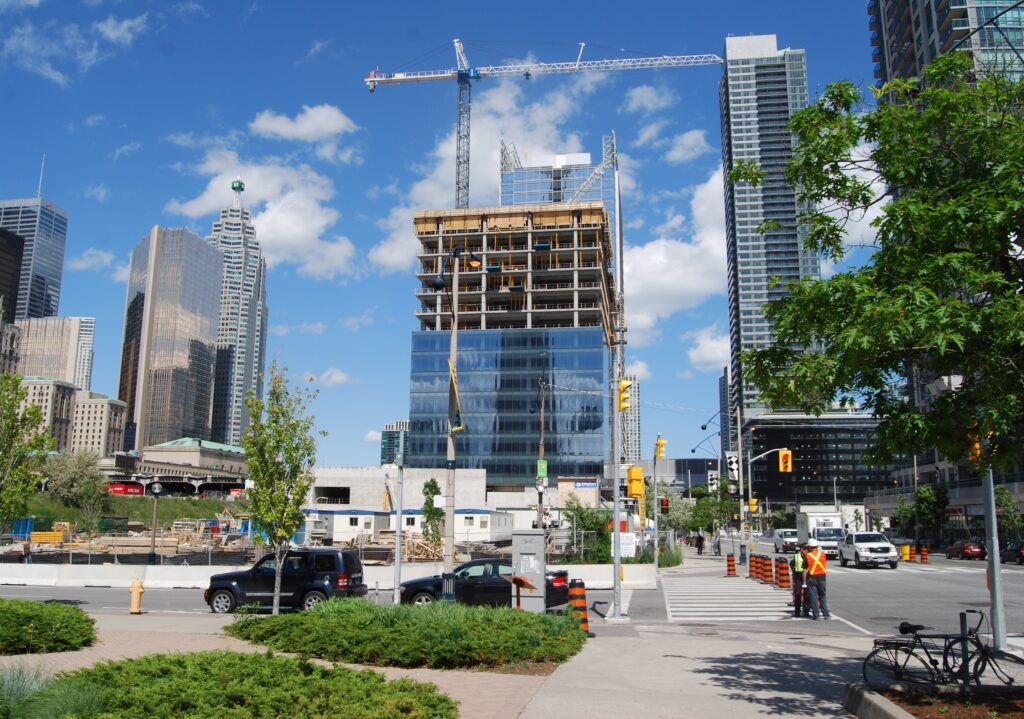
While the cost of new housing has gone through the roof, literally, the toll it takes on our economy and society is often hidden but equally significant.
The construction industry is a key part of the Canadian economy, employing a hefty number of workers in the residential and industrial, commercial, institutional construction sectors as well as in supporting industries. It is a key contributor to the Gross Domestic Product of our nation.
Roughly 1.6 million workers are employed in construction, or 7.8 percent of Canada’s employment. About 650,000 of those are working in the residential sector, building homes for Canadians.
The industry contributes $164.7 billion to the GDP, or 7.5 percent of the economy. As a percentage value of GDP, construction is fourth on the list.
Housing is a core need in economic terms. Yet, it is grossly overtaxed and overregulated, especially in Ontario and the Greater Toronto Hamilton Area (GTHA), to the point where the market is dysfunctional and unaffordable for the middle class. Builders are finding it increasing difficult to build houses that people can afford. Therefore, we have had fewer housing starts.
Sadly, it is a systemic self-inflicted wound with serious quality of life consequences.
Situation is Dire
A report completed by Boston Consulting Group (BCG) in partnership with CivicAction, a not-for-profit organization working to boost civic engagement, has shed some light on how the lack of housing is impacting the GTHA and undermining the economic vitality of the populous region.
The situation is especially dire in the GTHA. Toronto has 25 per cent fewer homes per capita than the G7 average. Home prices in Toronto are 1.6 times higher than the Canadian average and rents are 1.3 times higher. Hamilton homes are not far behind, at 1.2 times the national average.
High housing costs limit discretionary spending and makes it harder for individuals to save and pass on wealth. It also leads to increased food insecurity and a shortage of talented workers.
The BCG report highlights lengthy approval processes as a key reason for the shortage of homes. Municipal residential approval timelines average more than 20 months in the GTA, four times higher than in Calgary and more than two times higher than other cities in Ontario like Barrie.
Such delays slow the construction of homes and also increase the cost to build and finance projects.
Hope on the Horizon
The good news is that there is hope. Other jurisdictions around the world have turned their situation around.
As the report notes, London, U.K., gave essential workers priority on their affordable housing waiting lists and committed to build 6,000 rent-capped homes by 2030. The City of Boston made inroads by signing executive orders to reduce the housing approval process time by half.
Here in Canada, we need to start by speeding up the planning approvals process, lowering development charges (DCs), and dramatically lowering the tax burden on new housing.
In Ontario, the period for development approval processes often extends into years. Protracted planning processes delay housing construction and add significant project financing costs.
Municipalities should be required to post quarterly development approval metrics, so the province can monitor their ability to meet legislated timeframes. Those that don’t meet timeframes should have to undergo a third-party regulatory overview to bring them into compliance.
Action is also needed on DCs. They have been increasing at an exponential rate. The City of Toronto hiked the levies for single and semi-detached homes by 464 per cent between 2014 and 2024. The fees need to be rolled back across the province to the level they were a decade ago.
Further Steps Are Necessary
The federal Liberals have promised to cut the GST on new homes sold for under $1 million. The Conservatives have made the same commitment but set the price tag at $1.3 million, which makes more sense in cities like Toronto. The pledges are a step forward, but further action is necessary.
The Ontario government has removed the provincial sales tax from new purpose-built rental housing, but it also needs to be cut from new market housing as it is a big impediment to housing affordability.
RESCON would like to see the eight-per-cent provincial portion of the sales tax removed or rebated from new home purchases up to a maximum rebate of $80,000. The sales tax would still be applied on the remaining portion of the purchase.
To revitalize the residential construction industry, we need bold action that will provide measurable results. The economic impacts of doing nothing could be disastrous for our country.
Richard Lyall is president of the Residential Construction Council of Ontario (RESCON). He has represented the building industry in Ontario since 1991. Contact him at media@rescon.com.






